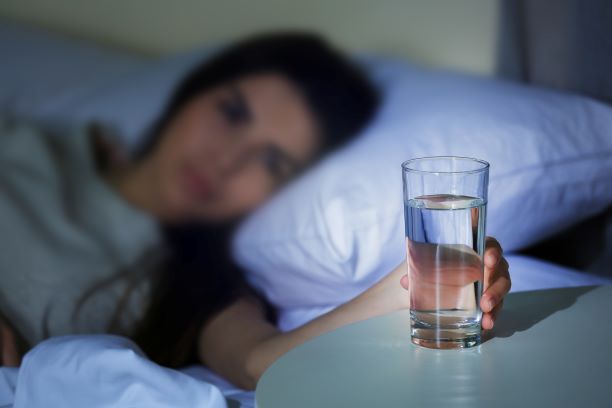Dehydrated? Get more sleep….Tired? Drink more water….it’s all connected.
This article reviews what we already know about proper sleep time and quality: if your sleep is disrupted it affects our entire body chemistry. Kidney function is also impacted by Sleep Apnea and other sleep breathing problems.
Proper length and depth of sleep is known to affect judgment, executive functioning, attention, mood, as well as a significantly affect our heart health, blood pressure, and increases risk for type 2 diabetes.
It’s been known for decades that children who bed-wet and adults who need to urinate 2-3 times at night likely have Sleep Apnea or one of a couple sleep-breathing problems.
Rosinger & colleagues analyzed 2 large database studies from China, looking at over 20,000 healthy young adults. Sleeping (16-59% more likely) less than 6 hours was correlated with dehydration by symptoms (thirsty) and measuring urine concentration and amount.
What’s the relationship?
Disturbed or shortened sleep disrupts the release of vasopressin, a hormone released at night when sleep quality and duration is normal. This hormone is released later in the sleep cycle in greater quantities and with increasing frequency the longer you sleep. WHY???? Without vasopressin, our kidneys would continue to “fill” throughout the night, causing us to wake up and urinate 2-3 times over a normal 8-hour sleep period. Vasopressin is released throughout the lateral stages of sleep and, with increasing release later in the sleep cycle. This makes sense…if you’re sleeping a “normal” 8 hours and entering all the stages of sleep such as REM and Stage lll, the body releases Vasopressin in those deeper sleep stages to slow the kidneys from filling up and causing you to wake up, go to the bathroom and, have to go back through the sleep stages…it’s disruptive to the body/brain repair sequence as we sleep.
Children with enlarged adenoids and tonsils can’t breathe well in deep sleep, so the body makes them restless and deprives their brain of REM sleep…all the while allowing their kidneys to fill. The result: bedwetting.
Adults who snore, have sleep apnea or women with sleep anxiety or frequent waking also don’t release as much Vasopressin, causing us to wake 2-3 times to urinate. Typically the 1st waking is just after midnight…
By morning, the body has dehydrated itself by the continued water loss and can cause long term dehydration symptoms such as muscle weakness, headaches, fatigue (similar symptoms as sleep apnea contribute to)…
Amazing how our physiology is so intricately designed!
Sleep Deprivation May Cause Dehydration
Published Wednesday 7 November 2018,
Medical News Today
By Ana Sandoiu




